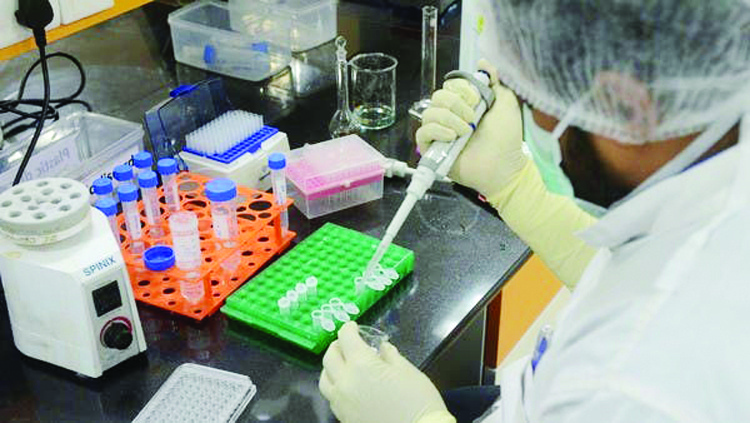
NEW DELHI: An Indian government-backed COVID-19 vaccine could be launched as early as February - months earlier than expected - as last-stage trials begin this month and studies have so far showed it is safe and effective, a senior government scientist told Reuters. Bharat Biotech, a private company that is developing COVAXIN with the government-run Indian Council of Medical Research (ICMR), had earlier hoped to launch it only in the second quarter of next year.
"The vaccine has shown good efficacy," senior ICMR scientist Rajni Kant, who is also a member of its COVID-19 task-force, said at the research body's New Delhi headquarters yesterday. "It is expected that by the beginning of next year, February or March, something would be available."
Bharat Biotech could not immediately be contacted. A launch in February would make COVAXIN the first India-made vaccine to be rolled out. India's cases of coronavirus infections rose by 50,201 cases on Thursday to 8.36 million, second only to the United States. Deaths rose by 704, with the total now at 124,315. The daily rise in infections and deaths has slowed since a peak in mid-September.
Kant, who is the head of ICMR's research management, policy, planning and coordination cell, said it was up to the health ministry to decide if COVAXIN shots can be given to people even before the third-stage trials are over. "It has shown safety and efficacy in the phase 1 and 2 trials and in the animal studies - so it is safe but you can't be 100 percent sure unless the phase 3 trials are over," Kant said.
"There may be some risk, if you are ready to take the risk, you can take the vaccine. If necessary, the government can think of giving the vaccine in an emergency situation." Health Minister Harsh Vardhan said in September the government was considering granting an emergency authorization for a COVID-19 vaccine, particularly for the elderly and people in high-risk workplaces. Several leading vaccine candidates are already in final-stage testing. An experimental vaccine developed by Britain's AstraZeneca is among the most advanced ones, and Britain expects to roll it out in late December or early 2021.
AstraZeneca has signed several supply and manufacturing deals with companies and governments around the world, including with the Serum Institute of India. Other late-stage vaccines are developed by Moderna Inc, Pfizer Inc with partner BioNTech SE, and Johnson & Johnson.
Meanwhile, Bangladesh signed a deal with the Serum Institute of India yesterday to buy 30 million doses of potential coronavirus vaccine being developed by British drugmaker AstraZeneca. AstraZeneca's experimental COVID-19 vaccine is seen as one of the most advanced candidates in the race against the novel coronavirus. "Whenever the vaccine is ready, the Serum Institute will give us 30 million doses in the first phase," health minister Zahid Maleque told reporters after the deal was signed in Dhaka.
He said five million doses of vaccine per month would be purchased through Bangladesh's drug maker, Beximco Pharmaceuticals. "We'll be able to vaccinate 15 million people as two shots of vaccine are required for each person 28 days apart," Maleque said. Bangladesh was in talks with development partners, including the World Bank and Asian Development Bank, to secure funds for the vaccine, government officials said.
Meanwhile, Sinovac Biotech's late-stage trial of a potential coronavirus vaccine in Bangladesh has become uncertain after Dhaka refused to meet the Chinese company's demand for co-funding. Experts fear Bangladesh might face another surge in infections during the winter, having so far confirmed 416,006 cases, including 6,021 deaths. The Serum Institute, the world's largest manufacturer of vaccines by volume, has partnered with AstraZeneca, the Gates Foundation and the Gavi vaccine alliance to produce more than a billion doses of a COVID-19 vaccine for global supply.
It is holding trials for three potential coronavirus vaccines, including one licensed to AstraZeneca by Oxford University. AstraZeneca has signed several supply and manufacturing deals with companies and governments around the world, while data in October showed the vaccine produces an immune response in both old and young adults. - Reuters
.jpg)
